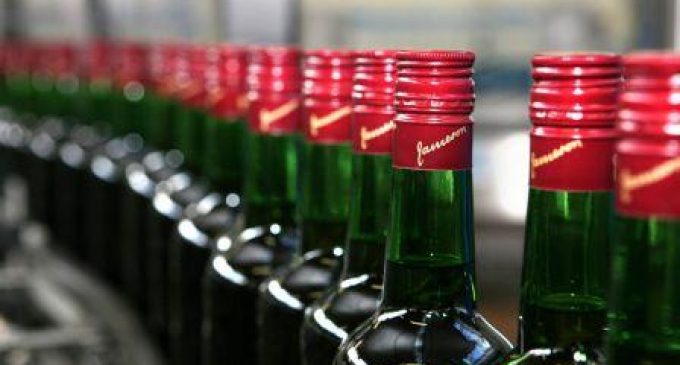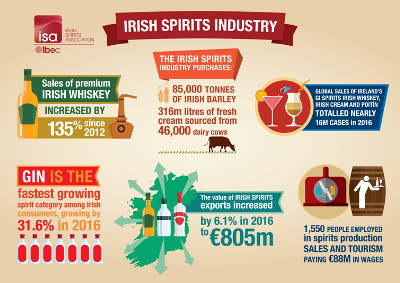Irish Spirits Industry Shows Vibrant Growth

The Irish spirits industry is undergoing vibrant growth, with exports increasing substantially in recent years, according to a new report released by the Irish Spirits Association. The report is the first-ever industry and market report on Irish spirits, and shows that the number of licensed spirits producers in Ireland doubled between 2014 and 2016.
According to the report, the majority of spirits consumed in Ireland (56 per cent) are produced in Ireland. A key trend in the Irish market has been the remarkable surge in the popularity of gin. Gin is the fastest growing spirits category among Irish consumers, growing by 31.6 per cent in 2016. The Irish Spirits Association recently established an Irish Gin working group to provide a strong voice for this rapidly-growing sector. Meanwhile, vodka remains Ireland’s most popular spirits drink, but sales have fallen by a quarter in the past decade.
 While the report notes that the Irish market is dynamic and rapidly-changing, the overall consumption of spirits in Ireland has fallen by 19.2 per cent over the past decade. While consumption of alcohol falls at home, the exports of Irish spirits are growing at an ever-increasing rate. The value of Irish spirits exports increased by 6.1 per cent in 2016, to €805 million. Overall, the value of exports increased by 29 per cent between 2011 and 2016, up from €624.27 million to €805.33 million. Exports are set to grow by even more in 2017, with Irish gin exports expected to make a breakthrough.
While the report notes that the Irish market is dynamic and rapidly-changing, the overall consumption of spirits in Ireland has fallen by 19.2 per cent over the past decade. While consumption of alcohol falls at home, the exports of Irish spirits are growing at an ever-increasing rate. The value of Irish spirits exports increased by 6.1 per cent in 2016, to €805 million. Overall, the value of exports increased by 29 per cent between 2011 and 2016, up from €624.27 million to €805.33 million. Exports are set to grow by even more in 2017, with Irish gin exports expected to make a breakthrough.
Global sales of Ireland’s GI spirits – Irish Whiskey, Irish Cream and Poitín – totalled nearly 16 million cases or 200 million bottles in 2016, according to the report. Geographic Indicators or GI protection means these three spirits can only be made on the island of Ireland in line with an EU approved technical file. GI’s protect the integrity and quality of these spirits categories and the investment being made in production and employment on the island of Ireland.
The report found that Ireland’s whiskey renaissance is going from strength to strength, with sales up 11.3 per cent in 2016. Irish whiskey is the fastest growing spirits category in the world, with sales of premium Irish whiskey up by 135 per cent in the last five years. The number of distilleries operating in Ireland has grown from just four a few years ago to 18 now. Irish whiskey exports are continuing to grow rapidly in 2017.
The report also notes that, following a lost decade for Irish cream liquor, 2016 saw a return to growth.
The Irish spirits industry is a major contributor to the Irish economy. Members of the Irish Spirits Association employ over 1,550 people in spirits production, sales and tourism, paying €88 million in wages. The Irish spirits industry purchases 316 million litres of fresh cream from Irish farmers, sourced from 46,000 dairy cows. Additionally, 85,000 tonnes of Irish malted and unmalted barley are purchased by the Irish whiskey industry every year.
William Lavelle, Head of the Irish Spirits Association, comments: “This report paints a bright picture of a dynamic industry with a vast economic footprint. The spirits sector is a major employer and a significant supporter of Irish farmers. It is an industry that can deliver even more exports, more jobs and more domestic sourcing if we’re allowed. Ireland’s GI spirits are a global success story. Protecting the GIs must be an ongoing priority. The Irish Spirits Association is calling on Government to ensure that the preservation of Ireland’s three All-Island spirit GIs remains a priority in Brexit negotiations.”
He continues: “One of the major threats that the industry faces at present is the Public Health (Alcohol) Bill. The Alcohol Bill will make Ireland one of the most restrictive countries in the world for marketing alcohol products. It will ban images of people, animals, scenic shots of Ireland and scenes in pubs from appearing in alcohol advertisements. These draconian restrictions will make it hard for new players to enter the market, as they won’t be able to market their products. We anticipate that this bill will undermine investment in the Irish Spirits industry. It will damage competition, deter innovation and it will threaten future export growth. We want to work to Government to achieve a more balanced approach that will effectively address concerns while preserving investment, competition and export growth.”

































